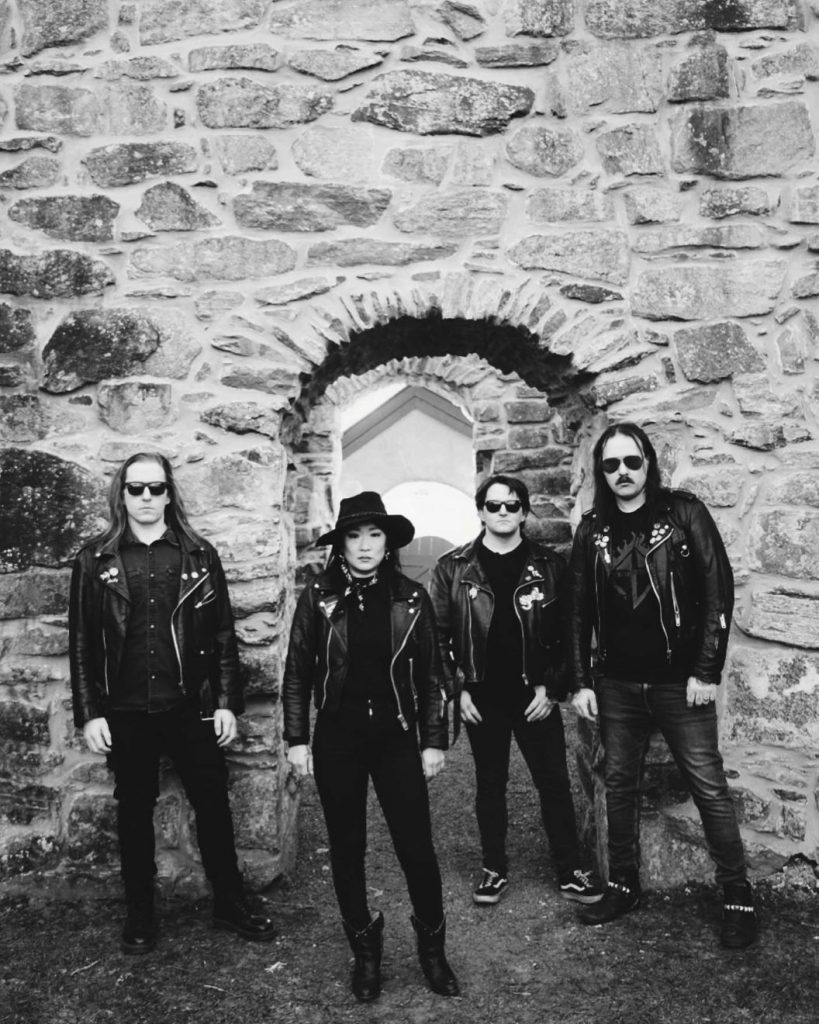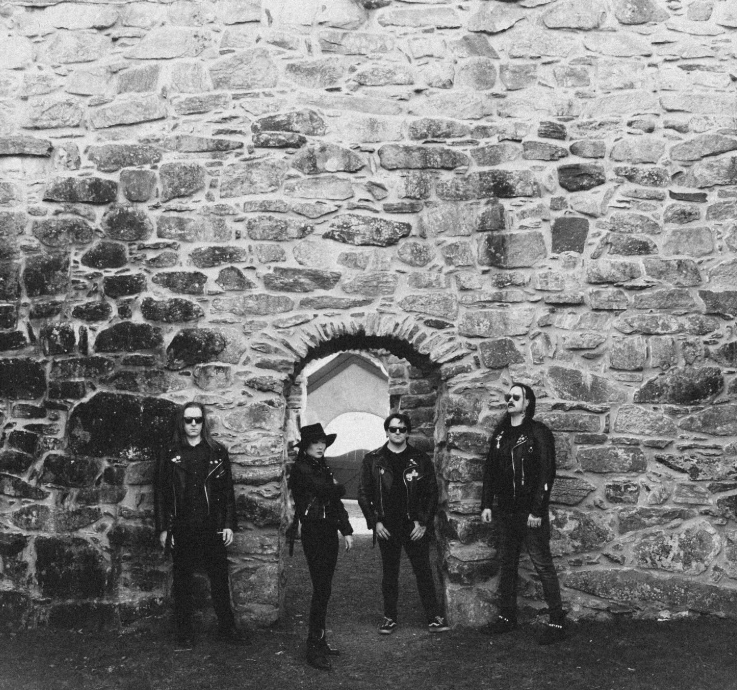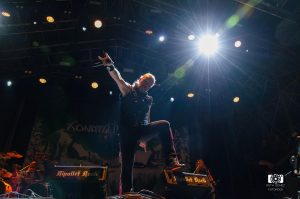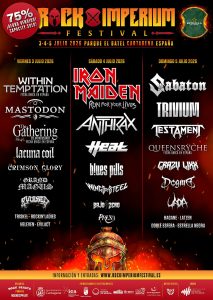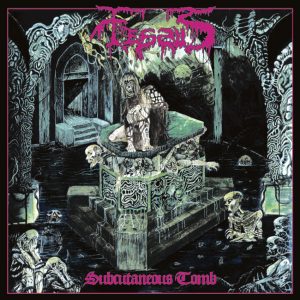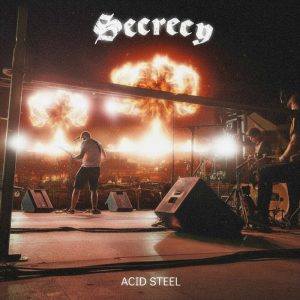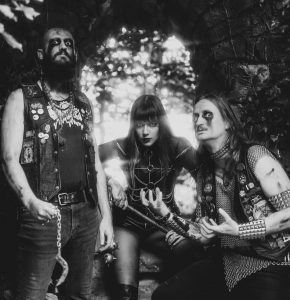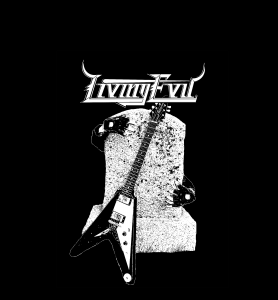INTERVIEW: SKRÄCKEN: Whispers Between Horror and Hope
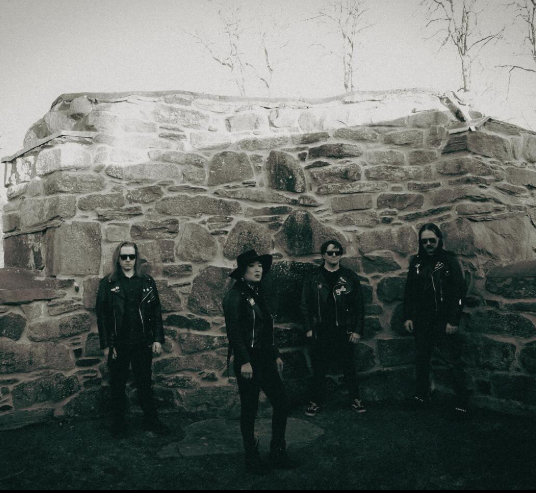
Out of the shadows of Sweden’s underground emerges a sound that feels both ancient and immediate—haunting, yet strangely intimate. This is music that doesn’t just scream into the void, but listens to it, wrestles with it, and dares to shape it into something fragile, furious, and alive. With their debut full-length, Echoes from the Void, the band invites us into a world where nightmares bleed into dreams, where heaviness coexists with vulnerability, and where riffs are not only weapons, but also lifelines. This is not just a record—it’s a reminder that even in the most desolate landscapes, sparks of connection can still burn.
First off, thanks for taking the time to talk with us! “Echoes from the Void” feels like a record that’s both haunting and strangely intimate. How does it feel to finally release your first full-length into the world?
(Daniel): Thank you! We are the ones who should thank you for wanting to interview us. It feels fantastic, we’re happy with how the album turned out. A dream come true!
(Martin): It was a long journey to get here, we started working on this album in 2023. So we’re relieved, excited and a bit exhausted all at the same time. But mostly super happy and proud with the result!
Your music has been linked to experiences like sleep paralysis and surreal, dreamlike states. Do you see these as purely personal expressions, or as metaphors for something collective—shared anxieties in the world we live in today?
(Daniel): It is both fictional and personal. There is a lot of anxiety in the world right now, we all feel it sometimes.
(Martin): I have experienced sleep paralysis for many years now. And it is a terrifying experience. So the idea for Skräcken came from one of my sleep paralysis episodes. Anxiety and worry can be a good driving force in being creative. When I was writing, I had a lot of frustration inside me that I wanted to get out.
The cover art and atmosphere of the album have been compared to Zdzisław Beksiński’s work—bleak yet strangely beautiful. How much does visual art feed into your music, and do you imagine your songs as soundtracks to those kinds of nightmarish landscapes?
(Daniel): When we first saw the cover, it felt right. Anders Muammar, (Actionsinger on instagram) who painted it, captured the feel of the music in a somber but beautiful way.
(Martin): Album cover art is at least as important as the music. It really has to feel right together. The job Anders did with the cover is perfect.
“Echoes from the Void” carries a strong sense of tension—between heaviness and melody, horror and beauty. Do you see this duality as central to your identity as a band?
(Daniel): Yes, that’s a central part of Skräcken. We are in the middle of horror, beauty and life. When it meets, it becomes the band Skräcken.
(Martin): When I wrote this record I wanted to get to a feeling of feeling down but still feeling hopeful. Mixing different emotions in the songs makes the music very deep. Mixing heavy riffs with melodies makes you feel a sadness but still a hopeful feeling.
(Sofie Lee): I think this is such a bang-on observation! Especially in a song like “Wasteland” there is really a full spectra of those feelings. I really like this with Skräcken, it brings a vulnerabililty that’s quite rare in todays music, in my opinion.
Some of you have backgrounds in different musical projects. How does that variety of experiences shape Skräcken’s sound and the way you work together?
(Daniel): The fact that we have played in several different musical projects is only positive, it means that the music doesn’t become too narrow-minded, it becomes more interesting.
(Sofie Lee): I’m used to writing almost all the lyrics and vocal melodies myself, so it was a bit different joining Skräcken so late in the process when everything was more or less finished. But it was a great way to be introduced to the band and just add a little touch to it. The previous singer had a bit more of an eerie vibe whereas I’m leaning a bit more towards soul, I think.
There’s a gothic, almost theatrical feeling to parts of the record, but also a raw energy that feels closer to punk. How consciously do you navigate between control and chaos when writing?
(Martin): I have an intuition that I go by. I know what suits the sound and what doesn’t. There’s a great awareness of all the choices I make when I write a song. It’s a balancing act that can be difficult to stick to. There’s a lot of control behind it, but it’s the intuition that gets to decide.
(Sofie Lee): When I first heard the songs I got a post-punk vibe from some of the faster ones, the guitars in “House Of Greed” reminds me of Sonic Youth for example. I’m not sure that was intentional haha, but I really enjoy that! I feel like the music, genre-wise, constantly is crossing over to something else and to me, that’s what makes it so interesting.
Your lyrics and atmosphere touch on dread, shadows, and hidden fears. Do you think heavy music can also be a way of confronting social fears—not just the personal or psychological ones, but also the collective ones we’re told to ignore?
(Daniel): Yes, music in general is a great tool to help you get through difficult times in life. Music can really help you get through most things, a kind of therapy. Music is like a friend who is always there.
(Martin): The lyrics are personal and we have written about events that have affected us personally. The great thing about writing lyrics is that you can interpret the lyrics exactly as you want. That you can create your own dream world by listening to the music and then reading the lyrics.
Community seems important in your journey—the underground, small labels, DIY ethos. In times where music is often treated like disposable content, do you see playing this kind of heavy music as an act of resistance or solidarity?
(Martin): For me, music is not something you throw away. There is a lot of work behind all the songs. And it is permanent for me. And I don’t play hard music because it is some kind of resistance in itself, but because it is something I listen to. Of course you want to support DIY and the community.
(Sofie Lee): I think just by being a small band, is some sort of resistance in itself. In Sweden, the view on culture is getting more and more narrow minded and streamlined. So just by that, all small venues and festivals where you get to play becomes a really big support for you and the other way around. I love the DIY scene, there’s a genuinity there not found elsewhere!
If someone discovers “Echoes from the Void” twenty years from now, what do you hope they feel? Confusion, fascination, recognition—or something else entirely?
(Daniel): If someone, a little late, discovers the album after some time. I hope the feeling is still there, they recognize themselves in the lyrics and the music touches them. Hopefully the music is in some way immortal.
Finally, thanks again for the conversation. What’s one thing you’d like listeners to carry with them after hearing “Echoes from the Void,” beyond the riffs and atmosphere?
(Daniel): Thank you for wanting to interview us! It has been a pleasure. We want to end by saying that whatever you’re going through, you are not alone!

